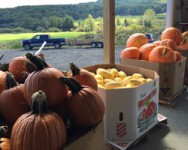Event Details
Date
February 21, 2017
Time
9:00 AM - 2:00 PM
Location
Centerville Fire Hall
Centerville, NY 14029
Cost
This event is free.
Host
Cornell Vegetable ProgramJudson Reid
585-313-8912
email Judson Reid
2017 Produce Auction Growers Meeting (Genesee Valley Produce Auction)
February 21, 2017
Come and learn how to make a profit at produce auctions! Speakers from other New York auctions (sellers and buyers) and Cornell Cooperative Extension will provide attendees will information on produce production for profit, diversifying your product line, high tunnel organic fertility approaches, disease resistance in tomatoes and cucumbers, and Food Safety Modernization Act and what it means for the auction.
AGENDA:
9:00 am Welcome, coffee, registration
Overview, Manager's update-consignment issues, lot sizes, policies, etc, -- Emanuel Girod, GVPA and Judson Reid, CCE Cornell Vegetable Program
10 secrets to success for a new auction; tips from 2 auction chairs -- Judson Reid
How to grow profitably at a new produce auction -- Harvey Lied, Finger Lakes Produce Auction
Harvey and his family have many years experience growing produce such as cantaloupe, watermelon and pumpkins for auction. He is a member of the Finger Lakes Produce Auction Board of Directors, shareholder and clerk.
Tired of low zucchini prices? Diversify your product line! The buyer's perspective -- Jeff Werner, Werner's Farm Market
Jeff and his family are both growers and auction buyers. He will share his experience in marketing crops based on size and use and his preferences as a buyer. Jeff also works for Harris Seeds.
My experience growing certified organic high tunnel tomatoes for auction -- John Stoltzfus, Seneca Produce Auction, and Harold Schrock, Advancing Eco-Agriculture
John is a certified organic dairy and produce farmer from Romulus, NY. He sells soil-grown greenhouse tomatoes at the Seneca Produce Auction. Harold will provide technical back-up on an organic fertility approach.
Disease resistance in tomatoes and cucumbers, 2016 research update -- Judson Reid
In Allegany County many farmers would like to grow vegetables organically. CVP research on disease resistant tomatoes and cucumbers provides critical information on varieties that deliver yield without conventional fungicides.
Beyond Tomatoes! Alternative crops for high tunnels -- Judson Reid
GVPA has tough price competition on tomatoes. What are some alternatives that pay, and how do we grow them? Judson will share data from several research trials on crops and fertility.
Lunch
Food Safety Modernization Act - What does it mean for the auction? -- Robert Hadad, CCE Cornell Vegetable Program, Ion Zimmerman, Finger Lakes Produce Auction Chairman, and Jeff Werner
Robert will demystify and put in plain language the new regulations for auction growers. Ion will share how they are implementing traceability. Jeff will share his experience as a buyer.
Q & A with grower panel
2:00 pm Adjourn



































